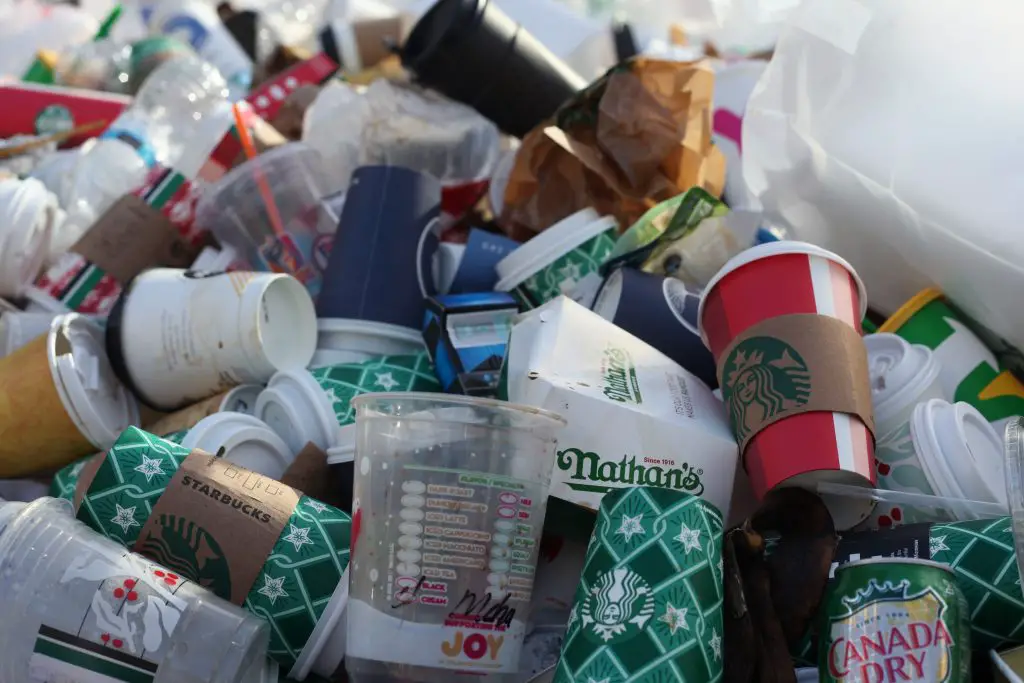You may have already aced going zero waste at home. Compost bin? Check. Reusable kitchen rolls? Check. Using glass containers instead of plastic? Check. Minimalist wardrobe? Check.
Now here’s an even greater challenge: taking your advocacy outside your home—specifically, on campus.
There are almost 2.4 million students in university in the UK (and currently 250 million worldwide). If each one of them (including you!) practised zero waste, we just might have a fighting chance to turn the tides against the global climate crisis.
Here are practical, absolutely doable tips for going zero waste at university.
Contents
Break Free from Single-Use

“There is no such thing as ‘away,’” explains Annie Leonard. “When we throw something away it must go somewhere.” Unfortunately, that ‘somewhere’ oftentimes ends up being our waterways and oceans.
What’s one occasional straw or styrofoam coffee cup, right? But multiply that by the billions of people who use them (then toss them) every day, and you’ll begin to understand why single-use plastic has become one of our biggest environmental nightmares.
Saying good-bye to single-use plastic is one of the most environmentally responsible things you can do. But it also means letting go of old habits and embracing new ones for the sake of our planet. Here are easy ways to achieve a plastic-free lifestyle on campus:
- Need your daily dose of caffeine before heading to class? Next time you go on a coffee run, ask your barista to pour you a cuppa inside your very own insulated flask. Or maybe just drink your coffee on site.
- Have water ready in a reusable water bottle so you won’t have to buy bottled water (which makes sense from an economic perspective, since bottled water costs 500 times more than tap water). You can just refill it from the tap or water dispenser throughout the day.
- Eat in instead of ordering takeout, this is again another source of plastic packaging waste. Better yet, prepare your own meals and snacks so you can have something to munch on when you run low on brain fuel.
- If you absolutely have to buy takeout, skip the packaging and plastic cutlery (and remember to ditch the straw!). Of course, this means being ready with your own set of silverware and reusable lunchbox or food containers.
- Having a party? Make sure to use reusable cutlery—or maybe even make it into a “zero waste”-themed celebration.
Go Paperless

While there’s an old-school charm to jotting down notes on pen and paper, we all know how carbon intensive papermaking is. (WorldAtlas estimates 24 trees are cut to produce a ton of standard office paper.) Besides consuming vast amounts of water, the paper and pulp industry also contributes significantly to air pollution.
Below are some alternatives to using paper in (and outside) class:
- Take notes with your phone, tablet, or laptop instead.
- Record lectures, if your professor allows it, and listen to them in your spare time. That way you’ll never miss a single tidbit of information.
- Go for electronic books instead of the print version.
- Ask your professor if you can e-mail your homework and course requirements instead of turning in a printed copy.
- If you have to print a document, print on both sides of the paper (and don’t forget to recycle).
- Ask to receive all your subscriptions and bills electronically, instead of getting them in the mail. Similarly, when buying from shops, ask if they can send you your receipt to your phone.
Minimize Your Carbon Footprint on (and off) Campus

By now it should be clear that the everyday things we do add up in the long run. Whether you’re engaging in cocurricular or extracurricular activities, reduce your environmental impact in uni by making these small lifestyle changes:
- Walk, bike, carpool, or take public transport when going around.
- Take the stairs instead of using the lift.
- Last person to leave the room? Make sure to turn off the lights, fans, air conditioner, and any equipment.
- Go for low-impact hobbies and activities: running, cycling, gardening—basically any sport or leisure activity that won’t require using extensive amounts of energy and resources.
- Avoid pulling all-nighters; as much as possible, accomplish all your activities during daytime.
Dorm Life

Whether you’re living on or off campus, you’ll find plenty of ways to make your private space more eco-friendly. Here are some of them:
- Conserve water: Take shorter showers and make sure to turn off the tap when you’re brushing your teeth.
- If you’re clothes aren’t visibly soiled and pass the sniff test, don’t take them to the laundromat just yet—wear them again. When you do wash your clothes during laundry day, make sure to was at full load, use cold water, and line-dry, where possible.
- Instead of turning up the heater, put on extra layers of clothing. Conversely, instead of using the A/C, dress light and open your windows to let cool air in.
- Use energy efficient lightbulbs like compact fluorescent (CFL) or LED. Of course, natural light is still the best.
- Looking for stuff for your room? Check if you can find second-hand items first before you consider buying new. You can even organize a dorm-wide swap for clothes, books, furniture, and school supplies.
- Sharing a room with roommates? Agree to synchronize your schedules (e.g., eating together at dinnertime, having a common study time and area) to save on energy.
- Remember to turn off the lights and unplug appliances and devices before you leave.
- Keep a compost bin for your kitchen scraps and leftovers and a recycle bin for used paper, plastics, etc.
- Cook from scratch (ideally with local, fresh, package-free ingredients) instead of buying packaged food.
Our final tip: Spread the word! Don’t just stop at educating yourself; invite others to join you in your zero-waste journey too. We always like to go back to our favourite quote.
“We don’t need a handful of people doing zero waste perfectly. We need millions of people doing it imperfectly.”
Anne-Marie Bonneau
Any other tips you can share with us on going green at university? Let us know by leaving a comment below!
Other Articles That May Interest You:
110 Simple Hacks for a More Eco-Friendly Life
How to Win (Green) Friends and Influence (Not-So-Green-Minded) People


Leave a Reply